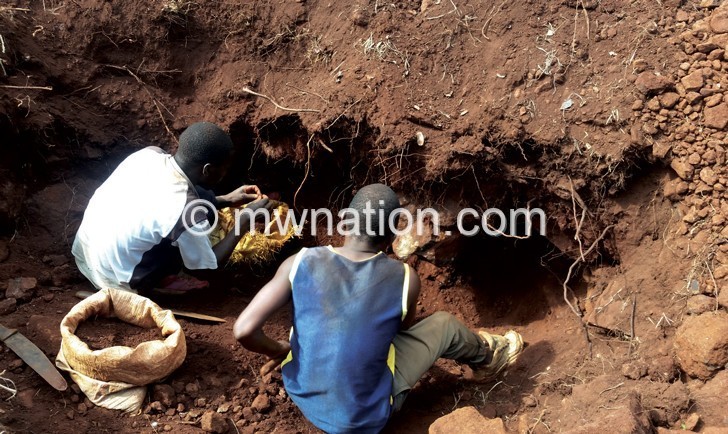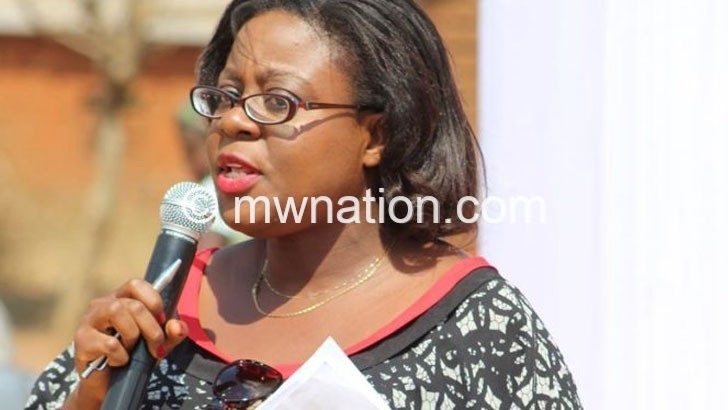Licence for sale: Mining deal embroiled in corruption
While communities around mining sites remain trapped in poverty, allegations have emerged, pointing to higher corrupt practices with investors and government officials planning to dine and share money, further crippling the sector and country’s economy.
Recorded voice and call clips in November 2019 detail how a Chinese investor managing Illomba Granite Company (IGC) in Chitipa dangled $300 000 (about K225 million) to senior government officials to have a mining licence renewed.

The investor, according to the clips, promised to dangle $200 000 (K150 million) to former minister of Energy BintonyKutsaira, $60 000 to the internal procurement committee (IPC) and $40 000 (K30 million) to director of Oil and Gas, Cassius Chiwambo who was supposed to broker the deal.
While all that much was supposed to exchange hands, people of Mbilima have only two boreholes drilled, costing less than K10 million and still have to walk for as long as 20 kilometres to access health services.
The villagers also still have a bad road, no electricity and their children learn under trees as classrooms are not enough.
IGC remains in the ownership of Faisal Hassen, under a renewed Mining Licence No. ML0019/95, which was issued by the Minister of Energy and Mining on June 28 1995 and expires on June 28 2020. The first licence was issued in 1988.
Finger pointing on corruption
Chiwambo admitted in an interview that the recording was done in his office, by a Chinese, who is working at Illomba, who had also claimed to have already bought some stake ($250 000) out of the $1 million which Hassen had offered.

He claimed the investor deliberately recorded him to tarnish his image, wondering why someone who does not deal with licences nor sit in the licence committee would be involved on the matter.
But this was not the first encounter with these investors. Chiwambo said the first time he interacted with them was early November 2019, when a lady, called July, wanted an export permit (EP), and he helped sign a document granting it.
He said: “After I helped authorise the EP, this lady offered to buy me a phone in China, because she was going there, and another phone for the IPC chair Gusto Mabvuto. I spoke to Mabvuto about the phone, and he was reluctant to accept the offer because he feared it would compromise his position and work.
“So, when July left and this other one comes to my office, and that is the reason why I was asking about the phone because July had promised. So in the discussion, the new guy told me that Minister Kutsaira had told him to come to me to help with renewing the licence.”
The oil and gas director further said at some point, he called Kutsaira, who told him that he was under immense pressure to deal with the issues at Illomba, as communities had gone berserk, chasing the investors.
“The minister told me to go undercover, listen to the Chinese person, to pretend, asking them why they are found in Chitipa because the licence belongs to Hassen who has on several times denied selling the licence.
“So, through the conversation, I learnt that the Chinese guy had sent some money to Hassen—about $250 000 [about K175 million]. It is not true that I enticed them into corruption, I mean, I don’t sit in the IPC, so how will I influence its decision?”

On his part, Mabvuto said a certain lady from the mine, only called by the name July, had offered to buy him and Chiwambo phones from China.
At that time, July was looking for an export permit, which was granted. However, Mabvuto said he had nothing to do with the issues discussed in the clips, and that by the time he left the ministry in March 2020, his committee was yet to discuss the Illombalicence renewal.
“There was no direct link between me and them. They were linking directly with Chiwambo, for whatever reason, I think Chiwambo can explain that himself. The only thing I remember, there was a certain lady who offered to buy me a phone through Chiwambo, but I refused.
“I didn’t want to be influenced when chairing the committee to renew or not renew the licence because that would compromise my position and work. We work as professionals and decide on merit and I didn’t want to have anything to do with the phone,” he said.
Hassen, who is selling the mine to the Chinese investors at $1 million price, as alleged in the recording, and as confirmed by Chiwambo, argued yesterday that it was Chiwambo who was trying to entice them into corruption.
In a lengthy e-mail response, Hassen said the meetings where the recordings were done did not take place at Chiwambo’s office, rather, he claimed the mines official located the house of the Chinese and went there at night.
“After all, Cassius Chiwambo has nothing to do with the Mineral Resource Committee. What he does, is align himself to the senior personnel of the ministry and uses his relationship to extort money from would-be investors under the pretext that he will influence the outcome of their applications.
“If, as he says, ‘I didn’t want to block him until I get all facts correct’….I worked as an FBI Agent”, who has he shared these facts with? Of course he has shared them with nobody, until now, ten months later!” claims Hassen.
While Chiwambo said the ministry was not aware of the potential sale of the mines, Hassen argued otherwise, stating, the Department of Mines was aware of this potential sale.
“In fact, the Chinese partners are even quoted by name in our application documents to renew our mining licence. Right now, the Department of Mines has also been provided with a copy of the agreement between our company and the Chinese investors.
“A copy of our tax clearance certificate has been provided to the Department of Mines. However, we have not approached Malawi Revenue Authority (MRA) with regards to the capital gains tax because our agreement has not been consummated,” he added.
Licence wrangles
Hassen claimed Chiwambo has been working with another company (name withheld)which has also formally submitted an application for the very licence.
He added: “If the application to renew our licence was declined, there could be a reasonable explanation as to why the Chinese attempted to offer a bribe to change the decision of the Mineral Resource Committee.
“As it happened, our application to renew our licence was approved for a further 10 years, but the minister refused to sign the document. The reason…the bribe was not forthcoming,” he claimed.
Bannet Msika, who is acting director of mines, and whom Hassen claims to have notified on the clips, refused to speak on the matter, saying, “Speak to the ministry’s spokesperson.”
Ministry spokesperson Sangwani Phiri said the matter only came to their attention on Wednesday, and senior officials from the ministry will meet to deal with it.
Kutsaira refused to speak on the matter, saying, he has nothing to say.
He said: “Just leave that issue, I have nothing to say on it, honestly, I have nothing to say on the matter.”
A mining governance expert ElyvinChawinga says these are serious things to be cautious with as a country that is still infant in mining.
“Mining should be done to put people out of poverty and here we are looking at the majority and not the minority.
As a country we have to make sure that we put safeguards that does not give room for corruption. The responsible authority need to take this matter seriously and do thorough investigations so that we can know where the gap was,” she says.
Oxfam in Malawi country director, LingalireniMihowa, whose institution is part of the Natural Resources Justice Network (NRJN) has urged also government to get to the root of the problem and bring to book all law breakers.
She said: “We need to find out exactly what happened, and ensure that if there were suggestions of bribery, then the people involved should be taken to book because that is the only way we are going to clean up the sector.”
NRJN chairperson Kosam Munthali urges the Anti-Corruption Bureau (ACB) to act.
ACB Director General Reyneck Matemba confirms that the bureau picked the matter from the social media and it is acting on it.
“Nobody reported, actually we picked it from the social media last week. I have seen the file,” he said.
IGC, according to the licence, is a limited company registered in Malawi under the Companies Act (Cap 39:01) and approved by the minister as having its registered address at P.O. Box 1226, Blantyre, Malawi.
But the controversy surrounding company (IGC) Limited at Mbilima in Chitipa, where sodalite is extracted, is not new.
In 2013, the Department of Mining cancelled the contract, but the decision was rescinded after the Minister of Mines’ intervention.
According to a letter titled ‘Cancellation of Mining Licence Number ML0019’, the then director of mining Charles Kaphwiyo informed IGC that the decision to rescind the cancellation was made by the minister.
Yet in another letter dated July 19 2017, the department also wanted to cancel IGC’s licence because the company had allegedly failed to deliver on the requirement to reinvigorate the mine.
Government also argued that the company had failed to comply ‘satisfactorily with the requirement of the Mines and Minerals Act and Regulations and Conditions’ of its licence. n





